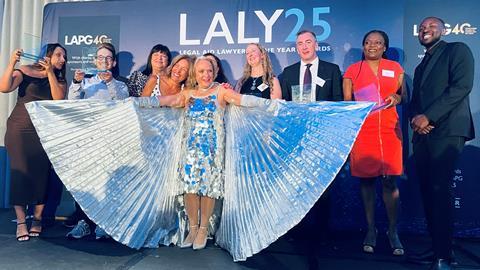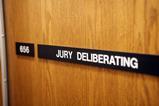The Legal Aid Lawyer of the Year Awards highlighted the full gamut of critical work, from representing prisoners to family law and immigration. Such advice ensures that ‘people’s rights have real, practical meaning’
Some 500 legal aid lawyers took a well-deserved night off last Friday. They gathered in central London to celebrate their work family’s achievements at the 23rd Legal Aid Lawyer of the Year Awards.
It has already been quite a year for the legal aid sector, as solicitor Jenny Beck, co-chair of the Legal Aid Practitioners Group, noted in her opening speech. She was, of course, referring to the cyber-attack that forced the Legal Aid Agency to take offline its ‘notoriously difficult and un-user-friendly’ IT systems. ‘Every legal aid provider in the country is being affected,’ Beck said. ‘None of us has been able to submit a bill since May. Some of us have been having agonising conversations with our banks to ensure we can pay salaries and keep the lights on. Chaos is not too strong a word.’
However, Beck noted, legal aid lawyers are resilient. The ceremony was a chance to celebrate the triumphs of lawyers ‘who, on behalf of our clients, stand up to often more powerful and better resourced opponents, whether they are rogue landlords, domestic abusers, big corporations or arms of the state’.
The first award of the night, legal aid newcomer, went to legal executive Yasmin Karabasic of SL5 Legal, who represents prisoners. A woman whose son is in prison said Yasmin was the only lawyer to get to know him as a person.
Manisha Knights, who set up MK Law in 2008, won the award for criminal defence. She was described as a role model, particularly for Asian women entering criminal law.
The award for family law including children’s rights went to Beverley Watkins, who has been at the legal aid coalface for 30 years, managing her caseload and running her Bristol-based firm.
The legal aid support staffer/support team award went to Kuda Tayengwa, billing coordinator at the Anti Trafficking and Labour Exploitation Unit. One colleague said anything to do with legal aid billing fills them with rage but Tayengwa ‘bears this with good grace and will persevere with getting all the information she needs’. Collecting her award, Tayengwa said: ‘It’s always about fighting to get paid. It takes time but you have to be patient.’
'There is still so much to be done to ensure that politicians understand, accept and promote legal aid as a true pillar of a decent, fair and democratic society'
Chris Minnoch, LAPG chief executive
Belfast-based Phoenix Law Human Rights Lawyers won the award for legal aid firm/not-for-profit agency. The firm played a key role in Dillon, which overturned the UK government’s attempts to end all Troubles-related litigation and investigations.
The social welfare law award went to Rachel Hogan of Children’s Law Centre, who the audience heard ‘fights to keep disabled people in education and [secure] access to basic services’.
Justin Ageros of 4PB collected the award for legal aid barrister. Behind a string of successful challenges to ‘parental alienation’ findings, Ageros was praised for taking on cases ‘no silk would touch due to the volume of complexity of work’.
The award for immigration and asylum law went to Laura Smith, co-legal director at the Joint Council for the Welfare of Immigrants. A Sri Lankan torture survivor said: ‘Laura did not just take on my case, she took on my pain. She really saved me.’
The audience heard that public law winner Shaun Livingston, of TV Edwards Solicitors, took a ‘curious route’ into social justice law – he started his legal career as an insurance litigator. What made him change direction, ceremony compere and Channel 4 broadcaster Symeon Brown asked? ‘It was so fulfilling acting for insurers I was almost too fulfilled,’ Livingston joked.
The outstanding achievement award went to Garden Court Chambers’ Stephanie Harrison KC, known for her immigration work, particularly in relation to children and immigration detention. LALY judges praised Harrison’s ‘incredible ability to spot what is morally wrong about the conduct of the state and turn that into a litigation strategy that will bring wider social change’.
Harrison said her work was not so much a reflection of her achievement but a ‘damning indictment of Home Office policy and practice on asylum’.
LAPG chief executive Chris Minnoch said the ceremony was about acknowledging the vital work of lawyers and support staff ‘who ensure that, irrespective of income, people’s rights have real, practical meaning because they can be enforced’.
Over the past year, the legal aid sector has seen ‘small shoots of recovery’ and the professionals keeping the system afloat are receiving ‘a more positive audience’ from the government, Minnoch added. ‘But there is still so much to be done to ensure that politicians understand, accept and promote legal aid as a true pillar of a decent, fair and democratic society.’
Pictured above: Some of the LALY winners with ceremony compere and broadcaster Symeon Brown (right), including Beverley Watkins (centre), who was undoubtedly best dressed legal aid lawyer of the evening.
This article is now closed for comment.





































1 Reader's comment